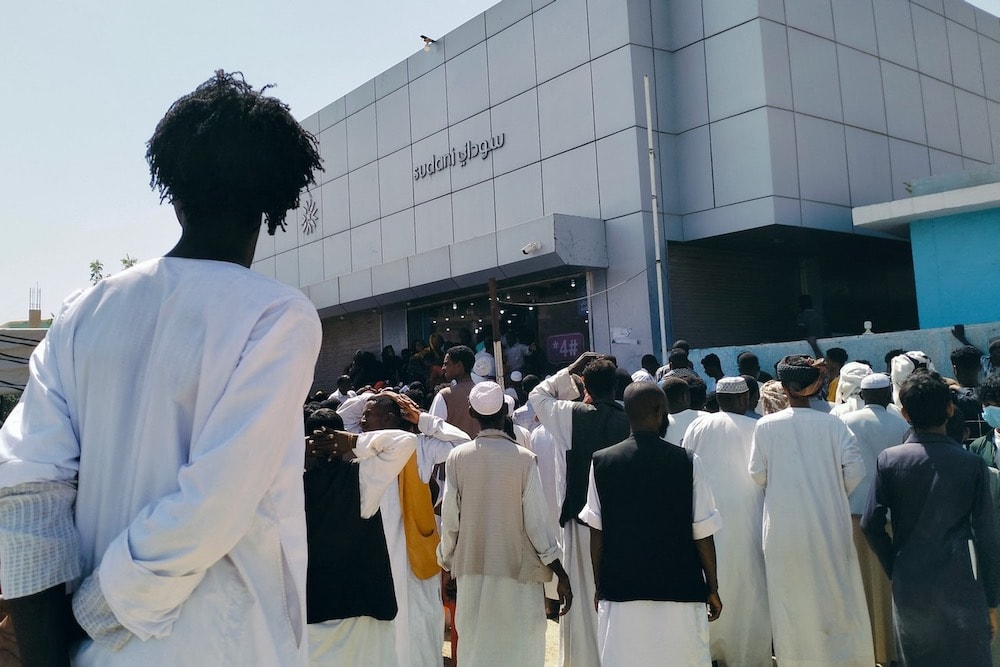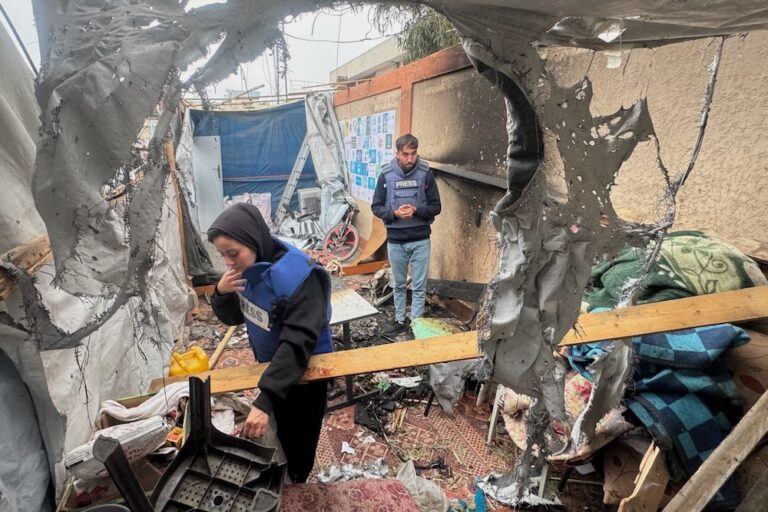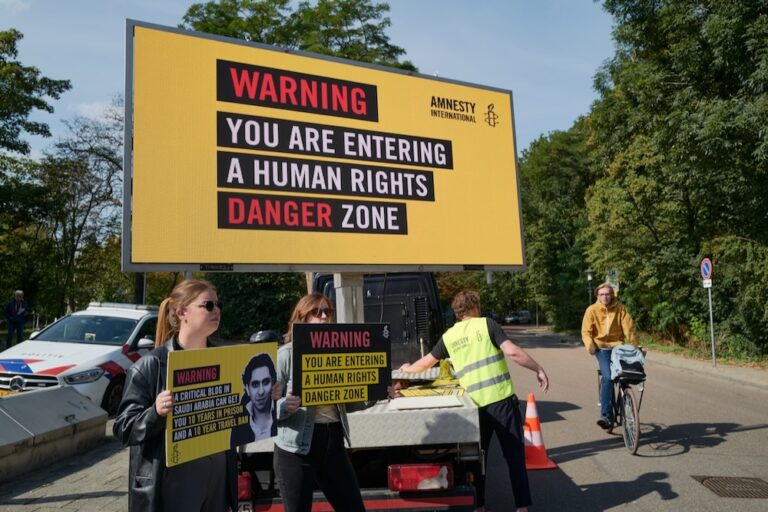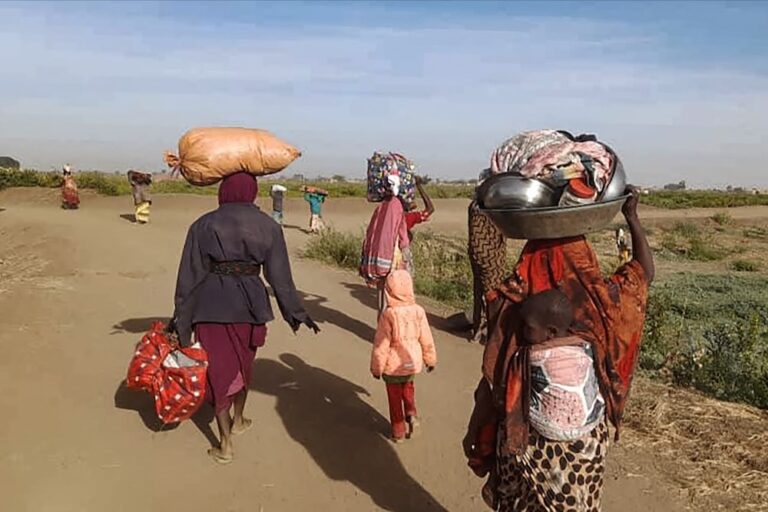February 2024 in MENA: A free expression round-up produced by IFEX's Regional Editor Naseem Tarawnah, based on IFEX member reports and news from the region.
Palestinian journalists continue to report despite forced displacement, targeting, and starvation. Sudan’s extensive communication blackout impedes the work of journalists already under threat. And Egypt doubles down on state repression.
Wars, and wars of words
With over 125 Palestinian journalists reportedly killed since 7 October, the unprecedented death toll has spurred calls for the international community to do more to protect journalists in Gaza. On 16 February 2024, Reporters Without Borders (RSF) and the International Federation of Journalists (IFJ) issued an appeal to the international community to put pressure on Israel to end the slaughter and “for journalism to live in Gaza.”
Their appeal also urged for the opening of the Rafah border crossing to allow international media entry, and an evacuation route for Palestinian journalists. RSF’s Gaza correspondent Ola Al Zaanoun, who was forcibly displaced from her home in Gaza City, was finally able to leave with her family after months of covering the war.
Al Zaanoun’s story is illustrative of the staggering toll the situation has taken on Gaza’s journalists, who continue to be the sole source of reporting in the absence of international media. From forced displacement and safeguarding their families in the face of Israeli strikes and a starvation campaign, Palestinian journalists are facing unprecedented conditions while bearing the responsibility of being the world’s only window into on the ground realities.
In an open letter affirming their support for Palestinian journalists, more than 30 news organisations underscored the critical role of their reporting:
“These journalists – on whom the international news media and the international community rely for information about the situation inside Gaza – continue to report despite grave personal risk. They continue despite the loss of family, friends, and colleagues, the destruction of homes and offices, constant displacement, communications blackouts, and shortages of food and fuel.”
Noting how entry into the Gaza Strip for foreign journalists has been all but impossible without the permission and supervision of the Israeli army, international news organisations called on the governments of Israel and Egypt to allow “free and unfettered access to Gaza for all foreign media.”
As the Israeli parliament advanced a bill to ban Al Jazeera’s broadcast in Israel as “threatening national security”, the network condemned the targeting of its crew north of Rafah by an Israeli drone on 13 February. Journalist Ahmed Matar was hurt in the attack, and correspondent Ismail Abu Omar’s injuries led to the amputation of his leg.
In the occupied West Bank and Jerusalem, Palestinian journalists have also faced an “intensive and systematic campaign” of flagrant violations against them by Israeli authorities. According to the Palestinian Center for Development and Media Freedoms (MADA), in addition to beatings and confiscation of equipment while reporting, journalists there have faced intensified efforts to silence their work since the war on Gaza began, with Israeli authorities detaining 44 journalists without charges since the war on Gaza began.
Online, Palestinian voices continue to face censorship, as well as hate speech and incitement to violence that has helped fuel the new Nakba.
A new report from the Arab Center for the Advancement of Social Media (7amleh) revealed that an average of 23 violent or hateful pieces of content against Palestinians have been published every minute since 7 October.
The organisation’s latest “Racism and Incitement Index” documented over 10 million instances of violent content in Hebrew disseminated on social media platforms since the war on Gaza began. The report stressed how online incitement has translated into real-world harm, perpetuating violence, justifying collective punishment, and exacerbating the dehumanisation of the Palestinian people.
Holding tech platforms accountable
In an effort to combat this proliferation of harmful content, 7amleh joined a Palestinian coalition of digital rights groups in a series of letters sent to social media companies, that called on them to take immediate and concrete steps to address and prevent it. Underscoring the International Court of Justice’s recent provisional measures in South Africa’s case against Israel, the letters to Meta, Telegram, X and TikTok highlighted the documented use of online platforms by Israeli leadership to incite genocide against Palestinians in Gaza.
“The failure to effectively address hate speech and incitement not only undermines the safety and well-being of the Palestinian people but also violates a company’s obligations under international law and human rights principles.”
CSOs also pushed back against hate speech policies of online platforms that have been used to actively censor criticism of Israel. In a letter to CEO Mark Zuckerberg, a coalition of 73 rights groups expressed deep concern about Meta’s proposed revision of its hate speech policy that would treat the term “Zionist” as a proxy for “Jewish” and/or “Israeli”; the coalition said this will ultimately lead to severe restrictions on legitimate political speech, stating:
“Not only will this proposal be ineffective at combating antisemitism, it entirely ignores the digitally fuelled oppression of Palestinians at a time when multiple courts and human rights experts around the world have affirmed the plausibility that a genocide is happening in Gaza and ordered all international actors to do whatever they can to prevent further harm.”
Sudan’s communication blackouts and the suppressed written word
Sudan’s protracted eleven-month civil conflict continues to exacerbate yet another mass displacement of a population in the region. With millions confronting a dire humanitarian crisis, the country has experienced a widespread and weeks-long communication blackout, severely impeding civil society’s ability to operate and respond effectively.
While digital rights groups pointed to the paramilitary Rapid Support Forces (RSF) as responsible for the blackout, the RSF blamed the army. The Committee to Protect journalists called on all parties in the conflict to “immediately restore mobile and internet services and cease undermining freedom of the press.”
“CPJ is gravely concerned that the latest, widespread communications blackout in Sudan will severely impede journalists’ ability to cover the war, potentially allowing attacks and atrocities to go unreported,” said CPJ MENA Coordinator, Sherif Mansour.
Recent weeks have seen journalists detained and killed in an increasingly hostile environment for media workers. Sudanese journalist Hawa Rahma eloquently articulated the war’s impact on independent journalism and the safety of journalists reporting in the country’s perilous conditions, writing:
“International conventions guaranteeing the safety of journalists do not apply here. In this war, the free press and freedom of expression are also targets. The goal is to suppress the written word, smash the cameras, and block accountability and principle. As we approach one year since this devastating conflict began, the world knows next-to-nothing about the full extent of the atrocities that are committed daily. Nothing is worse than seeing how truth has been suspended, like a patient sedated indefinitely.”
A recent investigation by the Arab Reporters for Investigative Journalists has documented how Sudanese journalists have faced hundreds of violations in an effort to silence their voices since the war’s outbreak, with both parties to the conflict systematically violating international law that mandates the protection of civilians and journalists.
The violence has also threatened the country’s media archives. The Sudanese Journalists Syndicate expressed concern that increased violence between the warring parties near the buildings of the Sudan Radio and Television Corporation in Omdurman risk destroying or damaging its media library, which they say “represent a political, cultural, and social legacy for the entire Sudanese nation”.
Entrenched repression in Egypt
Thirteen years after pro-democracy protests ousted former President Hosni Mubarak, Egypt continues to grapple with unprecedented repression. Tens of thousands of political prisoners languish behind bars and authorities persist in attacks against independent media, protesters, and civil society.
After a decade of President Abdel Fatah Al-Sisi’s rule, the country’s deepening human rights crisis – a crisis exacerbated by a worsening economic situation – has spurred rights groups to amplify calls on authorities to protect civic space.
“We urge the Egyptian authorities to immediately take steps toward addressing the needs and respecting the rights of Egyptians by releasing all political prisoners, ending practices of torture and ill treatment of detainees and protecting civic space. Only then can the demands of ‘bread, freedom, and social justice’ finally be achieved.”
Recent weeks have only served to further demonstrate how entrenched state repression is. On 6 February, a court sentenced prominent politician Ahmed Tantawy, along with his campaign advisor and 21 of his detained supporters, to a year in prison for peaceful political activism during his recent presidential challenge to President Al-Sisi. Tantawy has also been barred from running for national elections for five years.
The editor-in-chief of Mada Masr, Lina Attalah, was summoned for questioning yet again last month, this time following the independent news outlet’s recent reporting on Israel’s war in Gaza. Atallah is accused of running a “website without a licence” and “spreading false news” in a 2023 case related to its publication of a report on the displacement of Palestinians from the Gaza Strip. A recent investigation by Mada Masr exposed a corruption scandal centering on the profiteering from the movement of people and goods across the Rafah border crossing with Egypt by associates of the president.
Meanwhile, 18 CSOs denounced reprisals by Egyptian authorities and affiliated groups against the Sinai Foundation for Human Rights for its recent work. A concerted smear campaign and threats against the group and its UK-based director, Ahmed Salem, follows a widely covered report by the organisation revealing Egyptian authorities’ hurried construction of a fortified zone in the country’s North Sinai region bordering Gaza and Israel, to host forcibly displaced Gazans.
In Brief
Bahrain: Bahraini rights groups expressed solidarity with Bahraini-Danish human rights activist Maryam Al-Khawaja after she announced in an online video that she is battling Hodgkin’s lymphoma and launching a series of sit-ins in front of the Danish Prime Minister’s office in Copenhagen to demand freedom for her father, Abdulhadi Al-Khawaja, “and freedom for the Palestinian people.” “Maryam is a key member of the Gulf Centre for Human Rights (GCHR), and the former Co-Director. She is a very courageous woman. That is her character. At such a very difficult time she is thinking about the release of her father and the plight of the people of Gaza,” said GCHR’s Executive Director Khalid Ibrahim.
Lebanon: 80% of the targets of digital violence in Lebanon are women, reports IFEX-member Social Media Exchange (SMEX). According to statistics obtained by the digital rights group, digital violence against women in Lebanon is on the rise with new technologies providing new tools to inflict violence against them. Local initiatives addressing the issue include SMEX’s Digital Safety Helpdesk, which provides direct technical support to those facing digital attacks.



